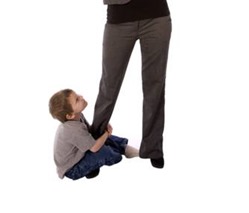
This week, I received a question on my blog from Mel, the mother of a 9-year-old boy, who wanted to know how to deal with a clingy child.
Here is what I wrote Mel. I hope you will find it encouraging. Most importantly, it is not as bad as it looks.
Dear Mel,
Clinginess is a reflection of a child’s confidence and trust in the world. The more clingy he is, the less confident he is. Kids are born dependent on a parent and they need to slowly build confidence to develop independence.
This process works in a cycle. Kids are dependent based on how confident they are. If they do not have confidence, they cling to the parent figure. The more they cling, the less confidence they have. In the other direction, the more confident they are, the safer they feel when they leave the parent to explore the world. The more they explore, the more confidence they gain
This process is very natural. There is nothing to worry about. Some go through it easily and others less so. Parents can contribute greatly to one side or the other by letting go of their need to control.
Success experiences, compliments, encouragement, softness, kindness, help, support, knowledge, and talent contribute to confidence and the child can let go of mum/dad and try new things. If he is clingy, it is not because something is wrong with him, it is because he does not have enough confidence to let go of you.
 It is very frustrating, but also manageable. I personally know people who are over 40 who are still clingy. It sounds funny but even adults sometimes need to depend on someone. Still, they are very successful in life. They have challenges but can still go to school, go to university, have jobs, be in relationships. They were dependent on their mothers as kids and simply swapped it for a wife later on. Not ideal but manageable. The worst case for your son, Mel, will be for him to find someone else to cling to.
It is very frustrating, but also manageable. I personally know people who are over 40 who are still clingy. It sounds funny but even adults sometimes need to depend on someone. Still, they are very successful in life. They have challenges but can still go to school, go to university, have jobs, be in relationships. They were dependent on their mothers as kids and simply swapped it for a wife later on. Not ideal but manageable. The worst case for your son, Mel, will be for him to find someone else to cling to.
The only way to un-cling a child is to spend more energy on building confidence than trying to minimize clinginess. The more attention you give to the undesired behavior, the more you will see it occur. It is a vicious cycle.
To know more about how to build confidence, check out my self esteem series. It has 18 chapters of tips on how to help your son build confidence.
Happy parenting,
Ronit











